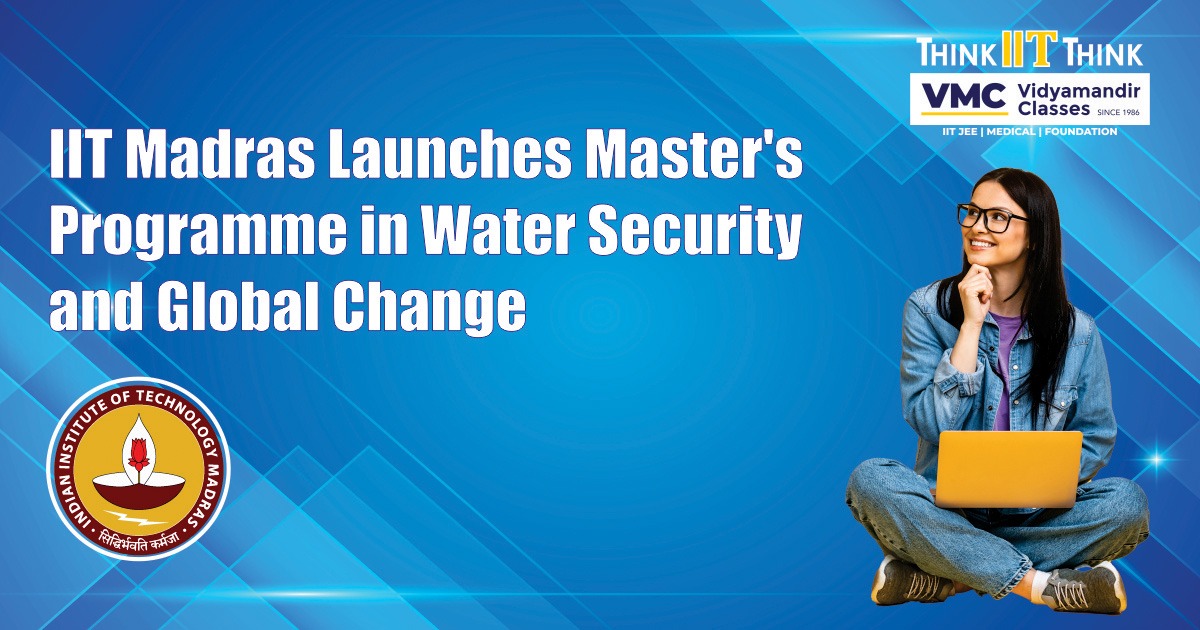IIT Madras Launches Master’s Programme in Water Security and Global Change
 Posted On
Posted On
379 total views, 1 views today
In a groundbreaking move towards addressing the pressing challenges of water security and global change, the esteemed Indian Institute of Technology Madras (IIT Madras) has introduced a pioneering joint Master’s Programme (JMP) in collaboration with two renowned German universities: RWTH Aachen and TU Dresden. Additionally, this initiative is in partnership with the Asian Institute of Technology (AIT) in Bangkok and the United Nations University Institute for Integrated Management of Material Fluxes and of Resources (UNU-FLORES).
This unique programme offers a comprehensive study path for both Indian and international students, aiming to equip them with the necessary knowledge and skills to tackle complex issues surrounding water security and global environmental change. Interested candidates have until April 30 to apply for this exceptional opportunity through the dedicated application portal provided by the institute.
Eligibility criteria for prospective applicants are clear and concise. Individuals with a Bachelor’s degree or its equivalent in specific engineering disciplines such as Civil Engineering, Mechanical Engineering, Environmental Engineering, Hydro Science Engineering, Water Resources Engineering, Computational Engineering, Agricultural, or Landscape Engineering are eligible to apply. Additionally, applicants must have completed their undergraduate studies with a minimum of 180 ECTS-Points or from an institution recognized by esteemed bodies such as AICTE, AIU, ACU, or IAU, with a cumulative grade point average of at least 60 per cent. Proficiency in English is also required, demonstrated through recognized English language tests like IELTS or TOEFL.
Financial aspects of the programme are transparent, with fees varying between IIT Madras and the partner universities in Germany. At IIT Madras, the semester fee is Rs 36,400, while at TU Dresden and RWTH Aachen, it amounts to Euros 287 and Euros 335 per semester, respectively. Medical insurance is included in the IITM fees, but students must arrange insurance for their stay in Germany. Additionally, accommodation, living expenses, and travel costs are not covered by the fees, although scholarship opportunities are available to eligible students.
One of the program’s highlights is the emphasis on practical experience through internships and master’s thesis projects conducted in collaboration with various organizations, including companies, governmental agencies, and non-governmental organizations (NGOs). This hands-on approach ensures that students gain real-world insights and experiences, enhancing their understanding and application of theoretical knowledge.
The programme offers students unparalleled flexibility, allowing them to experience academic life at three prestigious institutions: IIT Madras, TU Dresden, and RWTH Aachen. Students commence their studies at IIT Madras and then spend at least one semester at each of the partner universities, with the option to choose their preferred location for conducting their Master’s thesis. This mobility fosters a diverse and enriching academic experience, exposing students to different perspectives and approaches to water security and global change.
In a world where water scarcity and environmental degradation pose significant threats to human well-being and ecological stability, initiatives like the Master’s Programme on Water Security and Global Change play a crucial role in nurturing the next generation of leaders and innovators. By fostering interdisciplinary research and collaboration, the programme empowers students to address complex challenges and drive positive change on a global scale.
As the inaugural batch prepares to embark on this transformative journey, the stage is set for a new era of sustainable water management and environmental stewardship. Through education, innovation, and collective action, we can build a future where water is abundant, accessible, and secure for all. Join us as we take the first step towards a world of water security and global change.




